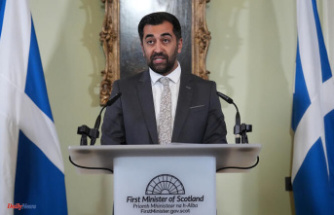Gal Shabi is standing in a large storage room surrounded by green sacks. "Helmets, uniforms, water bottles, everything soldiers need is in there," explains the 24-year-old, pointing to one of the many bags on the shelves. Shabi is based on a military base not far from Ben Gurion Airport in central Israel. While the young soldier of the Israeli Defense Forces (IDF) leads through the warehouse, the landing passenger planes roar in the background.
Shabi wears a uniform and an orange cap, she stands for the "Home Front Command": The unit is responsible for rescuing casualties, has a helicopter unit, for example, and also takes care of the needs of the population in times of war - during the pandemic, for example Corona tests.
The young soldier has a mental handicap, was born with a heart defect and was therefore actually exempt from compulsory service. But Shabi insisted on his service. "I wanted to do something meaningful for my country," he emphasizes. Even several heart surgeries could not stop him. "It was important to me, and my family agreed."
Since 2001, Israel's army has included people with physical or mental disabilities in military service. The "Special in Uniform" project takes a special path: through military service, the inclusion of people with disabilities in society is to be strengthened. The "specials in uniform" serve in all areas of the army and take on transport or logistics tasks, from the air force to combat and technical units. They are not trained on weapons.
In Israel, there is a strict obligation to serve in the army. Adult women serve two years, men 32 months, refusal carries a prison sentence. Ultra-Orthodox Jewish Israelis and Arab Israelis, for example, are exempt from compulsory service. However, the number of Arab soldiers has been increasing for years. In addition, the army can also have economic advantages in the future: many former soldiers in the technical units set up successful tech start-ups, for example, or former air force soldiers become pilots.
After conscription, all Israelis are tested on physical and mental abilities. A particularly high score qualifies for deployment in the Air Force or in engineering units. People with disabilities, for example in a wheelchair, with Down syndrome or with autism, actually have no chance. But "Special in Uniform" enables a volunteer program lasting several weeks, which includes encounters with soldiers and group activities in the army, as well as a final parade. After that they can volunteer for the army.
"You have to see that: They are standing there in uniform, proud to be part of the army and society," says officer Enav Leket WELT. She is responsible for the volunteer projects in the IDF and calls "Special in Uniform" a "real success story". A total of 1,500 volunteers completed the project this spring, a record. Lekev emphasizes that interest is growing steadily.
"The army can overcome boundaries in society," she says. People from all parts of the country, with and without disabilities, come together here and work together. "These smart, warm-hearted people make the army a better place." They take on important tasks and are treated on an equal footing with regular soldiers. Especially in technical units, many "specials in uniform" could contribute their skills.
Shabi has been part of the voluntary service since 2018 and has been a soldier since 2020. "I want to be able to tell my wife and children that I was in the army," he says. His twin brother did military service with the unit that takes care of the Iron Dome missile defense system. Shabi's younger sister will start her service this year.
After two years as a volunteer, he decided to start regular service in the army. There Shabi first worked in the camp, today he accompanies one of the officers in their daily work. “I organize the schedule, take care of the office or deliver corona tests to schools.” He particularly liked the trips across the country.
Recently, the Israeli government increased the pay for compulsory service. The basic salary is 1,500 shekels, the equivalent of around 415 euros. There are also bonus payments, depending on the effort and intensity of the activities. Disabled soldiers get the same payment as well as housing in close proximity to their base.
The army is also a symbol of identification for many. In the country, which is still under severe threat today, protection is of great importance. The military enjoys enormous prestige. According to an annual survey by the Israel Democracy Institute, 83 percent of Jewish Israelis say a "real Israeli" must have served in the military. Only 16 percent of Arab Israelis agree with this statement. The Jewish population's trust in the army is the highest of all institutions (90 percent), while the media (30 percent), government (29 percent) and parliament (28.5 percent) lag far behind.
Gal Shabi should be a role model for many other soldiers. That's why he was honored: On Yom Haatzmaut, Israel's Independence Day in May, he was presented with the President's Order of Merit. "I immediately told my family and they loved it."
"Kick-off Politics" is WELT's daily news podcast. The most important topic analyzed by WELT editors and the dates of the day. Subscribe to the podcast on Spotify, Apple Podcasts, Amazon Music, among others, or directly via RSS feed.












